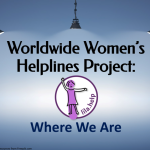PRESS RELEASE | The GNWS Launches Lila.help: A Global Directory of Support Services for People Experiencing Gender-Based Violence
Global Network of Women’s Shelters, UN Women, Meta and other organizations launch Lila.help as the first global directory of support services for domestic abuse and sexual violence
April 6, 2022 – Today the Global Network of Women’s Shelters (GNWS), along with UN Women, National Network to End Domestic Violence (NNEDV), Meta, and other organizations launched Lila.help, their global directory of trustworthy support services for people seeking support from domestic and sexual violence. This directory of helplines, local shelters and crisis centers is accessible for everyone – victims, survivors, family or friends, service providers, embassy or tourism staff, or anyone looking to find support.
“Lila.help is in itself a lifeline for those seeking support at a very urgent time. It is of enormous importance that every person can find safe, and up-to-date information wherever they are in the world. It is even more important that this information comes directly from the direct service providers themselves. This helps provide reliable and trustworthy information that is accurately tailored for local communities.” (Kalliope Mingeirou, Chief Ending Violence against Women Section, UN Women)
UN Women provided financial and technical support for the Lila.help, making it become the first truly global resource of its kind.
A global essential service
Advocates around the world have been discussing the need for a vetted global directory for many years. As Ashley Slye, Deputy Director of the Positively Safe program at the National Network to End Domestic Violence (NNEDV), says:
“I have been working for a long time with both NNEDV and the Global Network of Women’s Shelters, but when one of my friends came to me after experiencing sexual violence in Asia, I was unsure where to send her. In that moment I knew there was a need for a global directory highlighting vetted domestic violence and sexual assault helplines and crisis centers. With the development of Lila.Help, there is now a comprehensive, multi-national resource I feel comfortable sending my friends and family to if they need to reach help.”
In 2019 the GNWS started developing the directory and rallied victim advocates at the 4th World Conference of Women’s Shelters. At the time of launch, Lila.help includes national helplines from 95 countries, which will continue to expand as more verified support resources are added to the system. It provides data that is trustworthy, accurate and reliable because it is shared by organizations themselves. The online form allows local, national, and regional organizations the opportunity to enter their own data directly, providing as much detail as possible. Many organizations share their opening hours and contact information, along with descriptions of their offered services, including online services which became so important during the pandemic.
Reliable and trustworthy referral resource
To ensure all provided data is reliable and up to date, the GNWS uses a verification process by front-line service providers from its global networks. Once a form has been submitted, it is reviewed by someone within the GNWS network who knows that specific region or country and can make an informed decision whether this would be an organization ‘you would send your loved one to’, as the GNWS frames it.
“In Latin America, the access to services, especially during the pandemic, was very difficult. So, for us it’s like a dream come true to have all the valid and trustworthy services in just one click”, says Margarita Guille of the Interamerican Shelter Network. “Now that the technology gives us lots of opportunities to reach out to each other, to be in contact in real time, I think Lila.help is the real answer for all those that are looking for help for their daughters, sisters or themselves.”
Constantly up to date
All organizations in the directory will be regularly consulted if their data is still up to date. This provides organizations with the option to add, change, or update anything in their record. If they do not respond, their record will be made temporarily invisible, to avoid sending survivors to a shelter or helpline that had to close its doors due to lack of funding. With this system, Lila.help also gives organizations the option to update the information to show everything they can offer.
“We at Meta were eager to support Lila.Help in order to help survivors and their loved ones access resources immediately,” said Cindy Southworth, Head of Women’s Safety at Meta and founding board member of the GNWS, “Building the technology behind Lila.Help aligns with our priority of connecting people to accurate, life-saving information,”
Employees from Meta (formerly Facebook) developed these automated technology features as part of their efforts to support survivors of gender-based violence during the pandemic.
“In Japan, there are not enough organizations that provide full-fledged support for a wide variety of victims, and it is not easy to find and reach these organizations” Chisato Kitanaka, All Japan Women’s Shelter Network, explains. “Therefore, we have collected information on reliable support groups here at Lila.help, such as NGOs that support young women fleeing from abusive families, shelters that help foreigners, hotlines and online chats, one-stop support centers for sexual violence, and more. Especially during COVID-19, when women are often confined to their home with their abusive partner, services as an online chat are vital and we are pleased that Lila.help displays this information.”
Sustaining Lila.help into the future
For the GNWS, this is only the beginning. As described by Vivian Hartlief, the project lead of Lila.help:
“For the rest of 2022 we will focus on digging deeper, by identifying and supporting the available shelters, helplines, and NGOs in every country and territory in the world. Up until now we have a total of 95 countries, but in some cases, we only have the national helpline, when there are incredible local and regional organizations available.”
In addition, the GNWS will continue to make Lila.help more user-friendly. “We want to provide specialized search opportunities. For example, if you use a wheelchair, you need to know upfront if a shelter is accessible,” Vivian states.
Do you want to contribute to worldwide women’s safety? Donate to the GNWS to make sure that women can reach out for assistance, wherever they are in the world. Every contribution is welcome. Or reach out to us on ways you or your organization can collaborate with Lila.help.
About the Global Network of Women’s Shelters (GNWS)
The GNWS a global voice for survivors of violence against women and the shelters, helplines, and crisis centers that serve them. The GNWS was born at the 2008 first World Conference of Women’s Shelters in Edmonton, Canada when national networks from around the globe decided to combine their efforts to help survivors of violence and the shelters and crisis centres that support them. The strength and reach of the GNWS is due to its foundation of a global network of shelter/GBV networks, including continental, regional, national, state/provincial. More information: www.gnws.org
About UN Women
UN Women is the United Nations entity dedicated to gender equality and the empowerment of women. A global champion for women and girls, UN Women was established to accelerate progress on meeting their needs worldwide. UN Women works to prevent and respond to violence, to increase access to services for survivors and to make private and public spaces safer for women and girls. At the global level we work to advance international policies providing support to the United Nations General Assembly and the Commission on the Status of Women, and ensuring that the post-2015 development agenda includes specific targets to end violence against women and girls. More information: unwomen.org.



